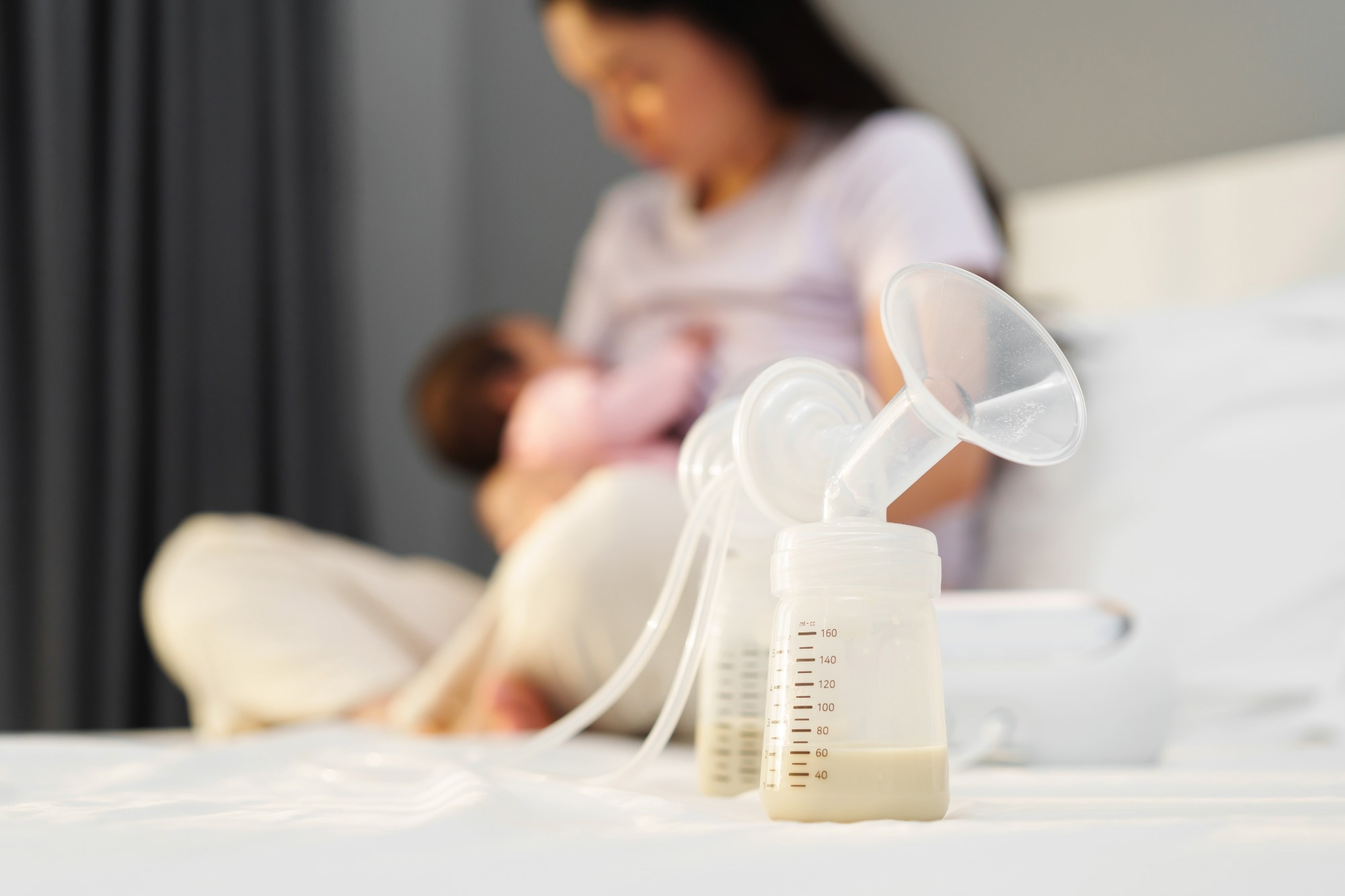In a recent study published in Frontiers, researchers investigated the transmission- and immunoglobulin G (IgG) viral neutralization potential of coronavirus disease 2019 (COVID-19) booster vaccine products (antibodies) passed from mother to offspring through breastmilk.
They evaluated the IgG concentrations of milk, plasma, and stool samples from 24 infants and 34 vaccinated mothers, 14 of whom received COVID-19 booster doses during the study.
Study: COVID-19 booster enhances IgG mediated viral neutralization by human milk in vitro. Image Credit: BaLL LunLa/Shutterstock.com
Background
Study findings reveal that booster vaccination substantially increased IgG levels in mothers’ milk and infants’ stool samples compared to unvaccinated participants.
In vitro neutralization experiments using a Severe Acute Respiratory Syndrome Coronavirus 2 (SARS-CoV-2)-like pseudovirus shows a 60% increase in the viral neutralization efficacy following the COVID-19 booster, highlighting the potential of booster dosed breastmilk to augment the otherwise poor immunity of infants against this terrible disease.
The role of maternal vaccination in infant immunity
The coronavirus disease 2019 (COVID-19) pandemic is one of the most disease outbreaks in human history, claiming almost 7 million lives and leaving hundreds of millions more debilitated since its discovery in late 2019.
While the rapid global development and administration of anti-COVID-19 vaccines significantly reduced disease impacts, infants present a vulnerable cohort because they are too young for conventional vaccinations, compounded by their underdeveloped immune systems.
Maternal vaccination during breastfeeding has been shown to effectively confer their infants protection against a number of viral diseases, with the United States (US) Centers for Disease Control and Prevention (CDC) recommending the intervention against whooping cough, respiratory syncytial virus (RSV), influenza, and most recently, COVID-19 (albeit with hitherto limited to no evidence backing the latter).
Previous work by the present research group established the presence of Severe Acute Respiratory Syndrome Coronavirus 2 (SARS-CoV-2) Immunoglobulin G (IgG) and IgA antibodies in human breastmilk and infant fecal matter, with Halasa and colleagues validating the benefits of maternal COVID-19 vaccination in infant immunity shortly after in 2022.
Unfortunately, subsequent studies revealed this immunity to be short-lived, with evidence suggesting substantial antibody concentration declines six months following vaccination.
While mRNA booster vaccine doses have proved instrumental in maintaining adult immunity against the pandemic, the transmission and viral neutralization efficacy of booster-derived, breastmilk-transmitted anti-COVID-19 antibodies remains unknown.
About the study
The present study aims to evaluate SARS-CoV-2 antibody titers in the milk and plasma of mother (following booster vaccine reception) and the stools of their infants.
They further use in vitro viral neutralization assays to elucidate the efficacy of these antibodies in eradicating VSV-gfp-SARS-CoV-2-S-gp, a SARS-CoV-2-like pseudovirus. The study was conducted at the University of Florida between December 2020 and May 2022.
It comprised 39 breastfeeding mothers and 25 infants, 34 and 24 of whom were included in the final analyses (due to lack of complete data for missing participants).
Study data included maternal/infant demographics, family and medical histories, and vaccination side-effects, collected via participant-completed questionnaires.
Additionally, blood (for plasma), milk, and stool samples were collected during enrolment and at each of the seven follow-up sessions included in the study design.
Of the included cohort, 14 mothers received a mRNA booster dose and comprised the cases against which the non-booster vaccine-receiving controls were compared.
Enzyme-linked immunosorbent assays (ELISAs) were used to measure IgA and IgG titers in plasma, milk, and fecal samples.
A SARS-CoV-2 Spike glycoprotein-expressing Vesicular Stomatitis Virus (VSV-gfp-SARS-CoV-2-S-gp) alongside infection-competent human ACE2 receptor expressing Baby Hamster Kidney fibroblasts (BHK cells) were used for in vitro neutralization assays.
The MTT (3-[4,5-dimethylthiazol-2-yl]-2,5 diphenyl tetrazolium bromide) assay was used to measure antibody neutralization efficacy. Modified plaque reduction assays were conducted to confirm MTT results.
Study findings
Demographic data analyses revealed that most of the 34 mothers and 14 included infants were non-Hispanic White women (mean age mid-30s and 10 months, respectively).
Booster vaccine doses were observed to substantially increase IgG concentrations in milk, plasma, and blood samples.
While IgA levels were also shown to persist above pre-vaccination levels following booster administration, these increases were found to be more subdued. These findings were mirrored when evaluating infants’ stool samples’ immunoglobulin titers.
“Throughout the 12-month period, we observed a less dynamic response in IgA levels in both human milk and plasma. The booster primarily triggered a rise in IgG levels, indicating a shift in the immune response toward a stronger IgG-mediated protection against SARS-CoV-2.”
Spearman correlations further present that the concentrations of IgG in milk and plasma are correlated, suggesting that one may be used as a proxy for the other in situations wherein specific blood or milk samples are unavailable for analysis.
These findings also highlight a time-dependent IgG titer response, with IgG concentrations progressively declining on advancing duration following booster reception.
Most notably, in vitro neutralization assays found significant increases in milk- and plasma-derived IgG neutralization efficacy, with estimated 60% and 90% improvements, respectively.
Validating these results using milk IgG depletion experiments showed that milk samples’ viral neutralization efficacy significantly declined following IgG depletion.
” Our results, from both the plaque reduction assay and MTT, show that cell survival and cellular activity is protected and preserved in cells treated with boosted plasma or milk during in vitro VSV-gfp-SARS-CoV-2-S-gp infection.”
Conclusions
The present study corroborates previous research highlighting the benefits of maternal vaccinations in reducing COVID-19 infection risk in breastfeeding infants.
Most notably, it highlights the potential of anti-COVID-19 booster doses to more than offset time-dependent IgG efficacy declines, evident through the boosters’ impacts on plasma, milk, and infant stool IgG titers.
“Although future studies are necessary to fully elucidate the specific mechanisms whereby luminal IgG confers infant protection, these works highlight the protective role of maternal milk-derived IgG. Our current studies add to the existing body of literature, further underscoring the importance of human milk-derived IgA and IgG in promoting infant health.”








